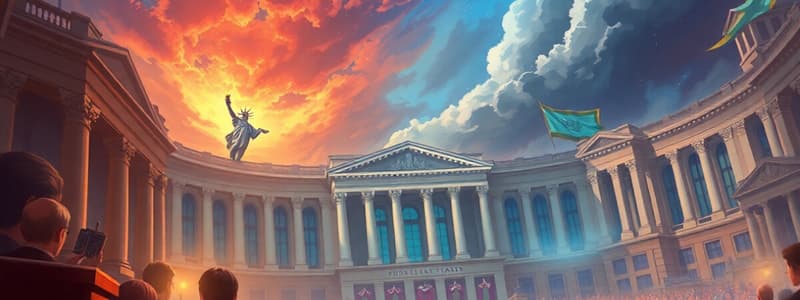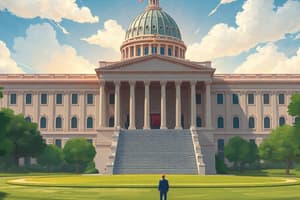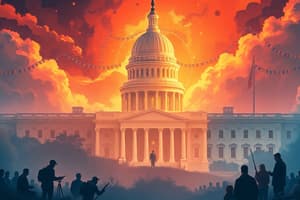Podcast
Questions and Answers
What was a primary concern of the Framers in designing the structure of the United States Congress?
What was a primary concern of the Framers in designing the structure of the United States Congress?
- Creating a system where states retained ultimate sovereignty.
- Preventing the concentration of unchecked authority in one branch. (correct)
- Establishing a powerful executive branch to lead the nation.
- Ensuring efficient and rapid lawmaking processes.
The 'necessary and proper' clause, also known as the 'elastic' clause, grants Congress significant implied powers. How have courts generally interpreted this clause?
The 'necessary and proper' clause, also known as the 'elastic' clause, grants Congress significant implied powers. How have courts generally interpreted this clause?
- With strict limitations, restricting Congress only to powers explicitly listed in Article I, Section 8.
- Narrowly, allowing Congress to act only when absolutely essential and in national emergencies.
- Deferentially, acknowledging and respecting the broad scope of Congressional power. (correct)
- Ambiguously, leading to frequent conflicts and uncertainty about the extent of Congressional authority.
Which congressional power is most directly related to its role as a check on the executive branch's independence?
Which congressional power is most directly related to its role as a check on the executive branch's independence?
- The power to declare war and raise armies.
- The power to regulate interstate commerce.
- The power to impeach and remove federal officials.
- The power of the purse, specifically appropriation and budgeting. (correct)
What is the primary focus of Congress's oversight function?
What is the primary focus of Congress's oversight function?
Impeachment represents the most extreme form of congressional oversight. What does impeachment primarily involve?
Impeachment represents the most extreme form of congressional oversight. What does impeachment primarily involve?
Historically, since the founding of the United States, what has been Congress's role in policymaking?
Historically, since the founding of the United States, what has been Congress's role in policymaking?
Contemporary analysis suggests that Congress's relationship with other political actors is constantly evolving. What is one significant characteristic of today's Congress compared to previous eras?
Contemporary analysis suggests that Congress's relationship with other political actors is constantly evolving. What is one significant characteristic of today's Congress compared to previous eras?
The study of Congress is recognized as a subfield within which academic discipline?
The study of Congress is recognized as a subfield within which academic discipline?
What is identified as the primary imperative for Congress, both as an institution and for individual lawmakers?
What is identified as the primary imperative for Congress, both as an institution and for individual lawmakers?
In the context of congressional representation, what is the core belief of the delegate model?
In the context of congressional representation, what is the core belief of the delegate model?
According to the content, who are considered 'constituents' in the context of congressional representation?
According to the content, who are considered 'constituents' in the context of congressional representation?
What is the primary justification for representative democracy as highlighted in Federalist 10?
What is the primary justification for representative democracy as highlighted in Federalist 10?
What is the fundamental purpose of separation of powers and checks and balances in the context of Congress?
What is the fundamental purpose of separation of powers and checks and balances in the context of Congress?
Which of the following best describes the trustee model of representation?
Which of the following best describes the trustee model of representation?
Considering the historical context implied by 'The Federalist 10', how might the concept of 'public good' be interpreted differently in contemporary Congress compared to the era of the founding fathers?
Considering the historical context implied by 'The Federalist 10', how might the concept of 'public good' be interpreted differently in contemporary Congress compared to the era of the founding fathers?
Which of the following is NOT explicitly stated as a core democratic principle defining Congress in the provided text?
Which of the following is NOT explicitly stated as a core democratic principle defining Congress in the provided text?
Flashcards
Delegate Model
Delegate Model
A model of representation where representatives act and vote based on the desires of their constituents.
Trustee Model
Trustee Model
A model of representation where representatives act and vote in accordance with their own judgment of what's best for their constituents, even if it differs from the majority opinion.
Constituents
Constituents
The people who reside in a specific geographical area and can vote for a representative in Congress.
Separation of Powers
Separation of Powers
Signup and view all the flashcards
Checks and Balances
Checks and Balances
Signup and view all the flashcards
Representative Democracy
Representative Democracy
Signup and view all the flashcards
Core Imperative of Congress
Core Imperative of Congress
Signup and view all the flashcards
Representation
Representation
Signup and view all the flashcards
Ambition Counteracting Ambition
Ambition Counteracting Ambition
Signup and view all the flashcards
Authority from Diverse Constituencies
Authority from Diverse Constituencies
Signup and view all the flashcards
Variation in Term Limits
Variation in Term Limits
Signup and view all the flashcards
Congress
Congress
Signup and view all the flashcards
Power of the Purse
Power of the Purse
Signup and view all the flashcards
Congressional Oversight
Congressional Oversight
Signup and view all the flashcards
Impeachment
Impeachment
Signup and view all the flashcards
Study Notes
Chapter 1: Representing and Governing in a Separated System
- This chapter discusses the US Congress
- The book's authors are E. Scott Adler, Jeffery A. Jenkins, and Charles R. Shipan
- The professor's name is Dr. Bianca Easterly
- The course is POLS 3314 – Legislative Process
- The main focus is on the core democratic principles of representation, separation of powers, and governing, as they relate to the US Congress.
Chapter Objectives
- Explain core democratic principles defining Congress (representation, separation of powers, governing)
- Identify key concepts emerging from congressional history
- Compare modern and historical Congresses
- Explain how political scientists study Congress
Congress and the Core Democratic Principles
- The primary function of Congress is representing constituents and governing the nation
- Lawmaking—passing laws, is a key function of Congress
- Appropriating funds is essential for governing effectively
- Oversight is the responsibility of Congress to monitor the executive branch.
Representation
- Members of Congress can view their roles as delegates or trustees.
- The delegate model emphasizes representing constituents' views
- The trustee model emphasizes representatives acting in what they believe is best for constituents
- Constituents are the people who support members of Congress geographically.
- Representatives are chosen by the people, making them more responsive to the public good.
Separation of Powers
- Separation of powers is a key concept to limit any branch's power
- Checks and balances are also in place to prevent the concentration of power
- Separation aims to limit unchecked authority and to ensure various constituencies are represented.
- Authority is derived from diverse constituencies, requiring compromise and negotiation
- Variation in term limits exists between branches to prevent excessive power accumulation.
Governing
- Lawmaking was a primary concern for the Framers.
- Congress has power to tax, spend, regulate commerce, and create necessary and proper laws.
- Congress has considerable power regarding the budget (appropriations)
- Oversight and the ability to impeach serve important controls on the executive branch.
Congress and American Politics Throughout History
- Key insights emerge from congressional history, helping build a representative democracy
- Congress is the primary policymaker in the US since the founding of the country.
This is Not Your Grandparents' Congress
- Modern Congress differs considerably from its past (textbook portrayal)
- Relationships with other actors are changing
- Parties being more polarized than ever
- The changing dynamic of the Congress
How Do We Know What We Know About Congress?
- Congressional research is a subject of political science
- Scholarly works are used to examine its operations and policies.
- The research explains the behind-the-scenes workings and political aspects beyond Capitol Hill
Studying That Suits You
Use AI to generate personalized quizzes and flashcards to suit your learning preferences.





